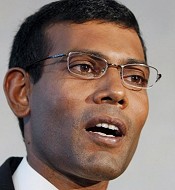VOA标准英语10月-Pro-Democracy Activist Wins Maldives Election, De(在线收听)
 |
| Mohamed Nasheed addresses media in Male, Maldives, 29 Oct 2008 |
Thousands of jubilant supporters of Mohamed Nasheed danced and cheered in the streets in Male, Wednesday, after the Election Commission pronounced him the victor of the runoff election.
Mohamed Nasheed ran as head of the Maldivian Democratic Party. He won about 54 percent of the vote, while President Maumoon Abdul Gayoom got nearly 46 percent. The runoff election was held after no candidate could get 50 percent of the vote in the first presidential poll, held earlier this month.
President Gayoom, who has ruled the chain of islands in the Indian Ocean for 30 years, has promised a peaceful transition. He had won six previous elections in the country as the only candidate and has been criticized for ruling like a dictator and suppressing his opponents.
In 2004, growing street protests and international pressure forced President Gayoom to allow some democratic reforms and paved the way for this month's multiparty election.
At forefront of the campaign for greater democracy was Mohamed Nasheed. He had been jailed several times on what human rights groups say are trumped up charges.
A South Asia analyst, S.D. Muni, says Nasheed's victory will strengthen the movement toward democracy in several small South Asian nations.
"This is important, looking at the democratization drive in South Asia. You have Nepal changing. You have Bhutan changing. Now you have Maldives also changing. So, it is strengthening the democratic trend in South Asia," said Muni.
Nasheed has promised to usher in more political freedom and root out corruption, which critics say is rampant under President Gayoom. He is also promising more broad-based governance, and an administration which will improve conditions for the average citizen.
Professor Muni says the new government will try to change a system in which President Gayoom's friends and relatives control most of the powerful posts in the country.
"Almost all the opposition parties seem to have come together under Nasheed Anni's support, and that would broaden up the governance and political system, with greater emphasis on not only democratization, but also on development and more of administrative efficiency," he said.
The Maldives is a chain of about 1200 low-lying islands, which has emerged as a top tourist destination in Asia. Gayoom has won praise for building a vibrant economy, with the highest per capita income in South Asia. But poverty persists in the country of 350,000 people, most of whom are Sunni Muslims.